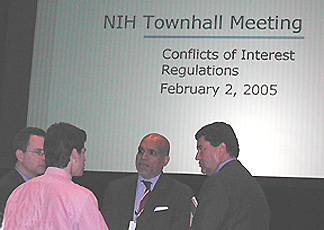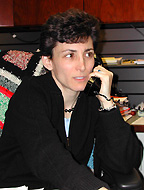
| T H E N I H C A T A L Y S T | F E B R U A R Y 22, 2005 |
|
|
|
The Talk of the TownNIH CONFLICT-OF-INTEREST REGS GENERATE IMPASSIONED GIVE-AND-TAKE |
by Fran Pollner |
 |
|
Backgrounder:
(left to right) John Burklow, NIH associate director for communications
and public liaison, NIH Deputy Director Raynard Kington, and NIH Director
Elias Zerhouni talk with Washington Post reporter Rick Weiss (back
to camera) on the occasion of the Town Hall meeting and the regulations
that occasioned it
|
The crowd at the all-hands NIH Town Hall meeting occasionally burst into ironic laughter—like when the scientists were reassured that they could probably still accept a Nobel Prize and not violate the new federal regulations on "Standards of Ethical Conduct and Financial Disclosure Requirements" for NIH employees.
For the most part, however, the mood was somber and the participants perplexed. NIH leadership had given the NIH community a heads-up on the general content of the new regulations—which would be effective immediately upon publication in the Federal Register the next day, February 3, and which would circumscribe the outside activities, awards, and stock holdings of NIH employees.
NIH Director Elias Zerhouni, NIH Deputy Director Raynard Kington, and NIH Ethics Office Director Holli Beckerman Jaffe variously explained the rationale and intention of the "interim final rule" and the meaning and implications of specific provisions. But there were questions that remained unanswered and objections that were not mollified.
The perception of conflicts of interest, the actual failure of some scientists to disclose financial arrangements, and the need for uniform reporting procedures throughout NIH culminated, Zerhouni said, in the DHHS-promulgated rule—a raft of pages of regulatory language that might be arcane in places but reflected decisions that "had to be made."
 |
|
Holli
Beckerman Jaffe, Director, NIH Ethics Office
|
"Our number-one priority," Zerhouni said, is preserving the public trust and continuing to be seen "as the ultimate source of unbiased scientific information." He rued the "actions of a few" that had compromised the perceived integrity of NIH, the inspired work of so many thousands of NIH scientists over the years, the increasingly critical and valuable NIH collaborations with industry, and the continuing ability of NIH to recruit and retain the finest scientific minds.After hearing a brief rundown on the new regs, those members of the audience who spoke at the mikes protested the harshness and seeming unfairness of many of the provisions. They expressed fears that following the rules would undermine the collegial exchange of vital information that leads to biomedical advances and would prohibit their continuing to engage in some of their most intellectually rewarding outside work (for an in-depth interpretation of what can and cannot be done under the new rules, see "The New Signals."). Some decried the across-the-board punitive nature of the NIH-targeted stock-holding regs—especially for NIH trainees and others who are here for a short term only. Recruitment, several speakers maintained, would be undermined.
Said one branch chief: "I can see some of these requirements as a precondition of hiring, but here the rules are being changed midstream and can cause irreparable financial harm."
Said a PI: "I can understand the stringencies placed on consulting arrangements. But where is the conflict of interest in investments? What’s the rationale? We’re not a regulatory agency. Do these rules apply to ALL the employees of HHS, or only NIH? Do they apply to the Department of Defense?"
Said a department director: "Do these rules apply to everyone who gets an NIH grant? And just what is a conflict of interest? Having more than one interest doesn’t mean a conflict of interest unless those interests are in conflict!"
"The investment restrictions are clearly punitive to NIH employees," another speaker said. "Our outside advisors are not subject to this—not the people from industry and the universities who sit on our councils and study sections . . ."
Said another, "How can the U.S. government in the year 2005 ask spouses to give up holdings so their spouse can maintain their NIH job? Spouses are independent people . . . the ACLU is quite interested in this."
The meeting went on for
nearly two hours. Some attendees were reassured that their favorite activities
were not only permissible but desirable; others remained frustrated. Zerhouni
exhorted the community to respond to the Federal Register
rule within the allotted 60 days. He also said that NIH would be examining
whether the new rules were having any "unintended consequences"—such
as adverse effects on recruiting and on NIH’s mission to provide for the
common good. ![]()